|

World AIDS day falls on 1st December 2009:
No compromise with AIDS
by Nilma DOLE
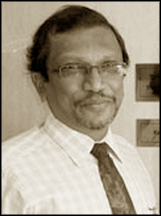 |
|
Dr. Nimal Edirisinghe |
Sri Lanka's school curriculum is changing with the introduction of
AIDS awareness needed not only to protect children from the deadly
disease but to instil values on leading a better life. It is important
that we talk about sensitive issues like AIDS (Acquired Immune
Deficiency Syndrome) to protect our children because if we hide under
the blanket of mystery, deadly consequences can happen. "There is a
misconception that AIDS is spread from mosquitos which is not true. The
stigma discriminating patients who have the disease is still present in
Sri Lanka," said the Director of the National STD (Sexually Transmitted
Diseases) and Aids Control Program (NSACP), Dr. Nimal Edirisinghe.
Today, we have successful AIDS awareness programs for schools in the
Sabaragamuwa Province. "We are thankful to Chief Minister Mahipala
Herath who sanctioned the AIDS awareness programs in schools in the
Sabaragamuwa Province. If the rest of the schools in the country follow
suit, then we can prevent the spread of AIDS."
Since a substantial segment of the population are students who
usually sit for the O/L, it is important to enlighten them on social
perils so that they could successfully face the challenges and threats
of society. In other parts of the island, there are many international
and national schools which are also participating in the AIDS awareness
campaigns. Even though their parents don't talk about sex, it is the
education system that should make children understandard how they can
protect themselves when they mature into adults.
Sex is still a taboo in Sri Lanka but by not talking about the
various Sexually Transmitted Diseases (STDs) and AIDS, the future
generations will contract them from the simple fact of not knowing about
it.
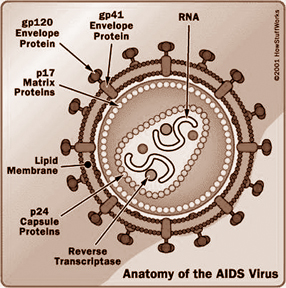 "Even though Sri Lanka is still a low prevalence country for
HIV/AIDS, the number of AIDS victims in the country is increasing," said
Dr Edirisinghe. "Even though Sri Lanka is still a low prevalence country for
HIV/AIDS, the number of AIDS victims in the country is increasing," said
Dr Edirisinghe.
He said, "There are some who don't divulge the disease for fear of
discrimination while there are HIV infected people who spread it since
they don't test their blood. Many more don't protect themselves from
this disease so we have to work on more than just awareness campaigns to
get the message across."
The NSACP building located near the Health Ministry doesn't have a
signboard due to the stigma of STDs but has a small notice with its
abbreviation. "We have a clinic to do free HIV screening tests managed
by 6 specialists with a team of 30 doctors.
With me, a total of 110 staff is working for the NSACP," said the
doctor. The General Hospitals and Base Hospitals around the island have
free HIV tests and the National Blood Bank screens blood as a counter
measure to prevent the spread of AIDS. The NSACP maintains strict
confidentiality to protect the identities of their patients by giving
them only a number.
"We place strong emphasis on educating the high-risk group that
includes MSMs or men who have sex with men, drug users using
unsterilised needles and those who contract HIV from others," stated Dr.
Edirisinghe who is at the NSACP for 4 years now.
"If you have the virus, it takes a long time to develop depending on
the individual's health.
However, you can infect others which is how some married women get it
from their unfaithful husbands," said the doctor. Eventually, infected
pregnant women transmit HIV to their children.
There are AIDs patients who live normal lives but it depends on their
level of immunity. "While some patients are badly affected by a weak
germ, others can live without problem provided they take medication"
said Dr.Edirisinghe. Speaking about how they spread the message to the
right group, the doctor said, "For example, if an AIDS patient is a
commercial sex worker who takes treatment from the NSACP, we use her as
an agent in protecting herself and those living in her vicinity. We
advise her on educating the high-risk groups in the area."
In addition, the doctor said that they even had to educate the police
force. "We have had to train police personnel about sex workers using
condoms because they sometimes use it as evidence in proving
prostitution. We now have successful advocacy programs to tell the
police that they shouldn't discriminate prostitutes with condoms because
it is one of the ways of preventing widespread AIDS epidemic. Hence, all
high-level police personnel have been enlightened on not condemning
prostitutes when it comes to using a condom.
Dr. Edirisinghe explained that the possible spread of AIDs is the
linked activity between one high-risk person to another. "It is a linked
cycle since we find cases where prostitutes have sex for money in order
to buy drugs where they use unhygienic needles and both activities can
make them contract HIV.
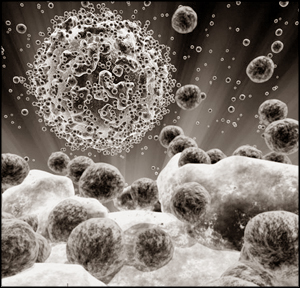 |
|
The deadly HIV |
There is also a high incidence of high-risk sexual and drug abuse
among males in prisons so we are in the process of educating prison
inmates as well," commented the doctor. Often, it takes anything from 6
months to 1 year for HIV positive victims to develop AIDS since it
depends on their immune system. "You can easily live with an HIV
positive person and not contract the disease. Using the same utensils or
washing in the same bathroom which an infected person used will not
infect you except only if there is a wound or blood involved," he said.
Dr. Edirisinghe enlightened, "The technology is so developed that an HIV
positive person can be a parent to a healthy child without giving the
virus to their partner or offspring," Dr.Edirisinghe explained. Also,
there are ways in which a mother can prevent the transmission of HIV to
her child with anti-retroviral drugs.
From the time Sri Lanka detected its first HIV positive person in
1987, about 1160 cases have so far been reported. "Out of this number,
we found out that 301 developed AIDS of which 201 have died and the rest
are leading normal lives" said the doctor. Commenting on the gender
incidence of HIV positive cases, Dr. Edirisinghe said that 20 years ago,
the percentage of women having AIDS was 20 percent but today, the
percentage has increased to 42 percent in terms of reported cases.
The percentage for men is 58 percent. "The trend is now increasing in
women rather than men since they often get it from unfaithful husbands,"
said the doctor. At the moment, 65% of AIDS victims in Sri Lanka are
from the Western Province and the rest of the percentage is scattered
islandwide.
If we don't speak on topics about sex, drugs and homosexuality, we
will not be able to control the spread of AIDs and HIV in Sri Lanka. "I
would advise anyone, not just those who suspect themselves of HIV to get
the free HIV test done preferably annually, just to be on the safe
side," said Dr. Edirisinghe.
|
Prevention of AIDS and HIV Infection
The only way to protect from contracting AIDS sexually is to abstain
from having sex outside the mutually faithful relationship. Otherwise,
risks can be minimized if you:
* Don't have sexual contact with anyone who has symptoms of AIDS or
who is a member of a high risk group for AIDS.
* Avoid sexual contact with anyone who has had sex with people at
risk of getting AIDS.
* Don't have sex with prostitutes.
* Avoid having sex with anyone who has multiple and/or anonymous
sexual partners.
* Avoid oral, genital and anal contact with partner's blood, semen or
vaginal secretions. Unless you know with absolute certainty that your
partner is not infected, a latex condom should be used during each
sexual act, from start to finish. The use of a spermicidal agent may
provide additional protection.
* Don't share sharp objects that could become contaminated with the
blood of anyone who is or might be infected with the AIDS virus.
* Exercise caution regarding procedures such as acupuncture,
tattooing, ear piercing, in which needles or other non-sterile
instruments may be used repeatedly to pierce the skin and/or mucous
membranes.
Such procedures are safe if proper sterilization methods are employed
or disposable needles are used. Ask what precautions should be taken
before undergoing such procedures.
NOTE: You cannot get AIDS/HIV from touching someone or sharing items,
such as cups or pencils, or through coughing and sneezing. Additionally,
HIV is not spread through routine contact in restaurants, the workplace
or school.
(Reference: www.healthscout.com) |
Your simple cold matters to us !
by Nadira GUNATILLEKE
I stepped into the Bandaranaike International airport hoping to see
more than few travellers with masks. But for my surprise I saw only one
for the three hours I spent there. I was a bit relieved and boarded the
flight hoping to see a lot of travellers wearing masks when I arrive at
Arlanda airport. But I was thrilled to see an almost empty airport
neither masks no passengers ! What a relief ! I almost forgot all risks
and started to move freely. This is not about wearing masks. It is all
about Novel Influenza (A)H1N1.
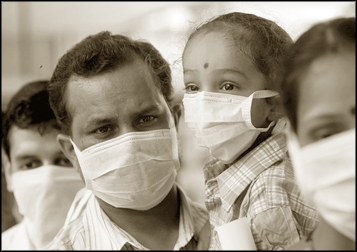 "Oh ! You are having a very simple cold. You don't need to take
medicine for that. Anyway who takes medicine for a very minor thing like
a cold ? You take medicine for a simple thing like this. Are you crazy
to take leave and stay at home because of a simple cold ? Are you crazy
to waste your leave on such a matter ? " Those are the exact words I
heard many times in my life. May be you also heard the same words at
least once in your life. It shows what type of attitude some people have
towards sicknesses. This attitude is good for you sometimes but it is
not good at all for the common society, especially at a time like this,
the Novel Influenza (A)H1N1 is spreading rapidly all over the world
including Sri Lanka. "Oh ! You are having a very simple cold. You don't need to take
medicine for that. Anyway who takes medicine for a very minor thing like
a cold ? You take medicine for a simple thing like this. Are you crazy
to take leave and stay at home because of a simple cold ? Are you crazy
to waste your leave on such a matter ? " Those are the exact words I
heard many times in my life. May be you also heard the same words at
least once in your life. It shows what type of attitude some people have
towards sicknesses. This attitude is good for you sometimes but it is
not good at all for the common society, especially at a time like this,
the Novel Influenza (A)H1N1 is spreading rapidly all over the world
including Sri Lanka.
It is heartaching to see the very irresponsible and dangerous
attitude of some people in society. Facing a disease without taking
medicines or reporting to work is something heroic for them! But they do
not think that it is deadly for some others such as the people who
suffer from chronic illnesses such as asthma, diabetics mellitus etc.
There is a possibility that they can lose their life because of your
simple cold and ignorance! What if one of your own family members dies
of a respiratory system related sickness because of the selfishness and
carelessness of another ?
The Novel Influenza (A)H1N1 is on the rise in Sri Lanka. According to
the latest statistics 260 cases had been reported from Sri Lanka from
many parts of the country and eight persons had died of the disease. The
State, the Healthcare and Nutrition Ministry or the provincial health
authorities cannot prevent any type of disease without the support of
the general public. It's another impossible mission !
"Oh, I can't breathe and I am shivering with fever. I have loose
motion too. I came to office because I have a lot of work to finish. The
other reason is I don't have much leave left and want to take leave for
my cousin's wedding. So I have to work these days no matter what happens
to me. I'll take a rest in the rest room/ladies room and go home after
my shift. Then I can save the leave". This is not something new for us.
All of us hear this story almost every day in our life and may be you
are one of the persons who says this to others. But the time has come to
think twice before reporting to work when you have a simple cold. May be
you are spreading (A)H1N1 among your colleagues free of charge
unknowingly !
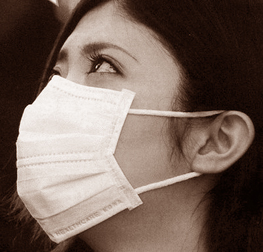 "Oh! My son had a cold today but I sent him to the school. Today
there is an important science lesson. He can't miss it". This is another
story you hear often. How about the other innocent children with chronic
illnesses who sit next to your son and study for six hours? May be one
of them can lose his life because of your attitude! Step into any road
of Sri Lanka and just walk hundred meters. You can find more than one
hundred spots where people have spat on the road. Spitting on roads or
anywhere possible is something `normal' in Sri Lanka. Some people never
cover their mouths when coughing. We can forgive the illiterate people
who do not have any idea about hygiene. But how about well educated
people who work in reputed companies? It is all about their selfishness
and irresponsible behaviour. "Oh! My son had a cold today but I sent him to the school. Today
there is an important science lesson. He can't miss it". This is another
story you hear often. How about the other innocent children with chronic
illnesses who sit next to your son and study for six hours? May be one
of them can lose his life because of your attitude! Step into any road
of Sri Lanka and just walk hundred meters. You can find more than one
hundred spots where people have spat on the road. Spitting on roads or
anywhere possible is something `normal' in Sri Lanka. Some people never
cover their mouths when coughing. We can forgive the illiterate people
who do not have any idea about hygiene. But how about well educated
people who work in reputed companies? It is all about their selfishness
and irresponsible behaviour.
It is the State which suffers because of the selfishness, ignorance
and carelessness of a few persons. It cost between Rs. 12,000 and Rs.
20,000 to carry out a test to detect (A)H1N1 in one blood sample. And it
takes 24 hours. A mask cost over Rs. 18.00. If the infected persons
follow the guidelines issued to the public by the Epidemiology Unit of
the Healthcare and Nutrition Ministry we can stop spreading Novel
Influenza (A)H1N1 immediately. Anyone can gain access to those
guidelines and to those issued by the WHO through media and the
Internet. It is up to you to save your fellow citizens. |

